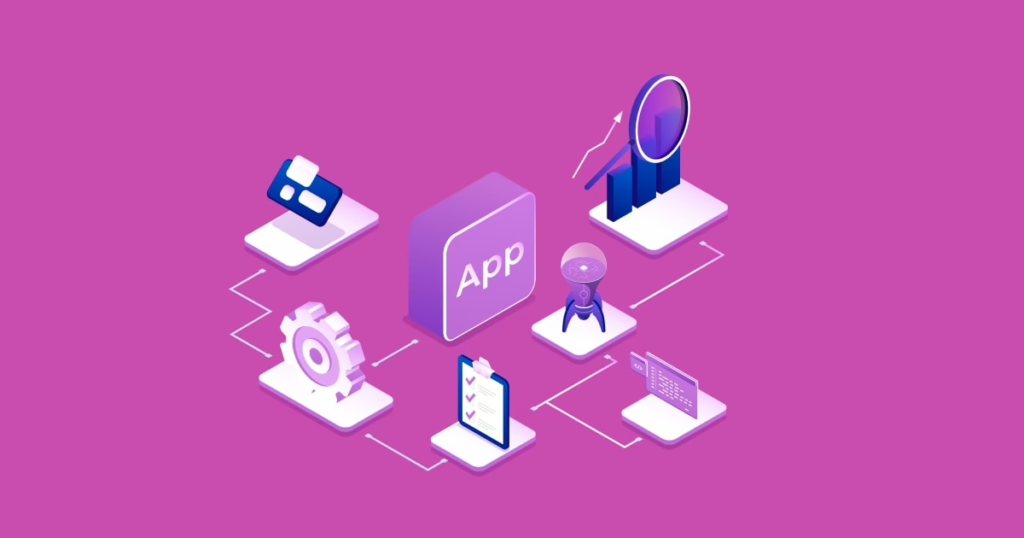Nowadays, enterprises rely heavily on specialized software to streamline operations and improve efficiency. Types of enterprise apps are designed to meet the needs of large organizations, driving productivity, optimizing workflows, and enabling better decision-making. This article will guide you through the top nine enterprise app categories to consider for your business, discussing their benefits, key features, and popular examples.
Table of Contents
What is an Enterprise App?
Enterprise applications, or enterprise app solutions, are software systems developed to address specific operational requirements of businesses, typically medium to large organizations. Unlike consumer applications, which are built for individual use, enterprise apps handle complex functions such as data management, customer relations, resource planning, and communication across various departments. They often integrate seamlessly into an organization’s existing digital infrastructure, fostering cohesive communication and collaboration.
Enterprise apps come in various forms, each tailored to support unique business objectives. Let’s explore these categories of enterprise applications to understand how they can enhance business outcomes.

Top 9 Types of Enterprise Apps to Inspire Your Business
1. Customer Relationship Management (CRM) Systems
Customer Relationship Management (CRM) software is a very important tool for managing a company’s interactions with current and potential customers. CRMs consolidate customer data and provide valuable insights, helping sales and marketing teams tailor their efforts to improve customer satisfaction and drive revenue growth.
- Key Features: Contact management, sales tracking, lead generation, customer segmentation, and analytics.
- Pros: Enhanced customer experience, increased retention rates, and better-targeted marketing strategies.
- Cons: Can be costly and complex to implement, with a steep learning curve for new users.
2. Enterprise Resource Planning (ERP) Systems
Enterprise Resource Planning (ERP) solutions integrate multiple business processes into a single system, making it easier to manage functions like finance, HR, inventory, and procurement. This centralization allows organizations to have a single source of truth, streamlining operations and reducing redundancy.
- Key Features: Financial management, HR management, inventory tracking, supply chain management, and real-time reporting.
- Pros: Improved operational efficiency, data consistency, and reduced manual errors.
- Cons: Expensive and time-consuming to implement; may require significant customization.
3. Human Resource Management (HRM) Software
HRM software helps companies manage their workforce more effectively, covering processes such as recruitment, payroll, benefits administration, and performance tracking. By automating HR tasks, companies can save time and resources while improving employee satisfaction.
- Key Features: Employee records, payroll processing, benefits administration, recruitment tools, and performance reviews.
- Pros: Simplifies HR processes, enhances employee satisfaction, and improves compliance.
- Cons: Initial setup can be complex, and data security is critical given the sensitive nature of HR information.
4. Business Intelligence (BI) and Analytics Tools
BI tools analyze data to provide actionable insights that inform business decisions. These tools help companies understand market trends, track performance metrics, and identify potential opportunities, making them essential for strategic planning.
- Key Features: Data visualization, dashboards, predictive analytics, and reporting.
- Pros: Enhanced decision-making, competitive insights, and improved efficiency in data-driven tasks.
- Cons: Data quality is crucial; insights depend on data accuracy, and training may be needed to interpret complex data.
5. Supply Chain Management (SCM) Software
Supply Chain Management software optimizes the flow of goods and services from suppliers to customers. It provides transparency across the supply chain, helping companies minimize costs, manage inventory, and respond to changes in demand quickly.
- Key Features: Inventory management, order processing, demand forecasting, and logistics management.
- Pros: Reduced costs, better inventory control, and improved supplier relationships.
- Cons: Implementation can be costly, and disruptions in data can significantly impact operations.
6. Project Management Tools
Project management tools are essential for teams to collaborate effectively, monitor progress, and ensure projects stay on track. These tools provide a centralized space for communication, task assignment, and deadline tracking, fostering better team coordination.
- Key Features: Task management, team collaboration, time tracking, file sharing, and reporting.
- Pros: Increased productivity, improved collaboration, and real-time project insights.
- Cons: Can be overly complex for smaller teams, and constant updates may require adaptation.
7. Content Management Systems (CMS)
A CMS allows companies to manage and publish content on websites or internal portals, simplifying the process for non-technical users to create, edit, and distribute digital content. Popular for marketing and communication purposes, a CMS enables businesses to maintain an online presence with minimal technical hurdles.
- Key Features: Content creation, editing, publishing, media management, and user permissions.
- Pros: User-friendly, reduces dependency on technical teams, and allows for consistent content updates.
- Cons: Limited customization options and potential security risks.
8. E-commerce Platforms
For companies engaged in online selling, an e-commerce platform is a must. This type of enterprise app manages product listings, payments, order tracking, and customer interactions in an online store environment.
- Key Features: Product catalog, shopping cart, payment gateway, inventory management, and customer support tools.
- Pros: Expands sales reach, 24/7 availability, and improved customer convenience.
- Cons: Requires robust cybersecurity, and operational costs may be high for smaller enterprises.
9. Collaboration and Communication Tools
Collaboration tools have become indispensable, especially for remote or distributed teams. These applications allow employees to communicate, share files, and manage tasks in real-time, enhancing teamwork and reducing misunderstandings.
- Key Features: Messaging, video conferencing, file sharing, project boards, and integration with other enterprise tools.
- Pros: Improved productivity, better communication, and flexibility for remote work.
- Cons: Can be distracting if overused, and security is paramount for sensitive communications.

Examples of the Best Types of Enterprise Apps
Understanding the types of enterprise software is just the first step; seeing examples in action can provide valuable insight into how these applications transform businesses:
- Salesforce (CRM): Widely recognized for its customizable CRM platform, Salesforce helps businesses manage customer relationships and drive sales.
- SAP ERP: Known for its comprehensive ERP solutions, SAP integrates finance, HR, and logistics, making it popular among large enterprises.
- Microsoft Dynamics 365 (BI/Analytics, ERP, CRM): With versatile modules for CRM, ERP, and analytics, Dynamics 365 caters to various business needs.
- Slack (Collaboration): A robust communication tool, Slack supports seamless collaboration across distributed teams.
- Shopify Plus (E-commerce): Ideal for enterprise-level e-commerce, Shopify Plus supports scalability and offers advanced sales features.
These popular enterprise application examples demonstrate the value and efficiency that enterprise apps bring to large organizations.
Choosing the Right Enterprise App for Your Business
Selecting the appropriate types of enterprise apps for your business can be a transformative decision. To make an informed choice, consider the following factors:
- Business Goals: Determine if your priority is improving customer relations, managing resources, or streamlining collaboration.
- Scalability: Choose an app that can grow with your business, accommodating increasing demands and data volume.
- Integration: Ensure the app integrates smoothly with your existing systems, from legacy software to modern cloud solutions.
- User Experience: An intuitive interface can reduce training time and enhance productivity across teams.
- Vendor Support: Assess the vendor’s reputation for support, updates, and ongoing service.
By aligning the app’s features with your specific needs, you can ensure it adds measurable value to your operations.
Things to Consider Before Investing in an Enterprise App
Before investing, it’s essential to evaluate whether the application aligns with your company’s infrastructure and long-term goals. Here are a few crucial points to weigh:
- Cost: Enterprise apps can be a significant investment. Analyze the total cost of ownership, including licensing, implementation, and maintenance. The worldwide enterprise application software market is projected to reach $569 billion by 2027 with a compound annual growth rate of 13.0% (2022 through 2027).
- Implementation Timeline: Complex software, like ERP systems, can take months to deploy. Plan accordingly to minimize disruptions. Enterprise software forms the digital backbone of large organizations, streamlining operations and improving efficiency.
- Training Requirements: A user-friendly application can ease adoption, but some solutions may require in-depth training sessions for teams.
- Data Security: Ensure the software adheres to data protection regulations, especially if it involves customer or employee information.
- Future Upgrades: Consider whether the application can be easily updated or expanded to accommodate future technological advancements.
By evaluating these factors, you can make a strategic choice that supports your company’s growth and minimizes risks.
Frequently Asked Questions
1. Why do businesses need enterprise apps?
Enterprise apps simplify complex business processes, improve communication across departments, and enhance productivity by automating routine tasks.
2. How long does it take to implement an enterprise app?
Implementation times vary based on the type and complexity of the software, ranging from a few weeks for simpler tools to several months for comprehensive systems like ERPs.
3. Are enterprise apps expensive?
Costs vary widely depending on the app’s functionality, licensing, and customization needs. However, the ROI can be significant, often outweighing the initial investment.
4. Can small businesses benefit from enterprise apps?
While traditionally used by larger organizations, many enterprise apps now offer scalable solutions suitable for small and medium-sized businesses.
5. What role does data security play in enterprise apps?
Data security is paramount, especially for applications that manage sensitive information. Choose software that complies with security standards and industry regulations.
Conclusion
The right enterprise app can transform your organization, optimizing processes and boosting productivity. Whether you’re looking to improve customer relations with a CRM, streamline operations with an ERP, or enhance team collaboration with a project management tool, these types of enterprise software provide a comprehensive range of solutions tailored to various business needs.
If you’re ready to find the best enterprise app for your business, consider Vinova’s expertise in delivering enterprise app solutions that are secure, scalable, and designed to tackle today’s business challenges. Reach out to learn how we can support your digital transformation.